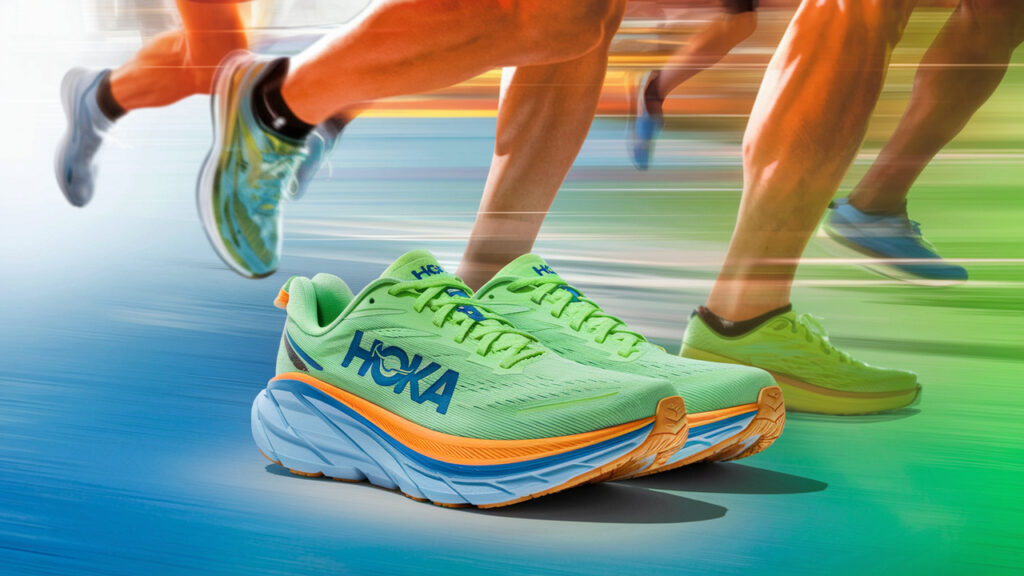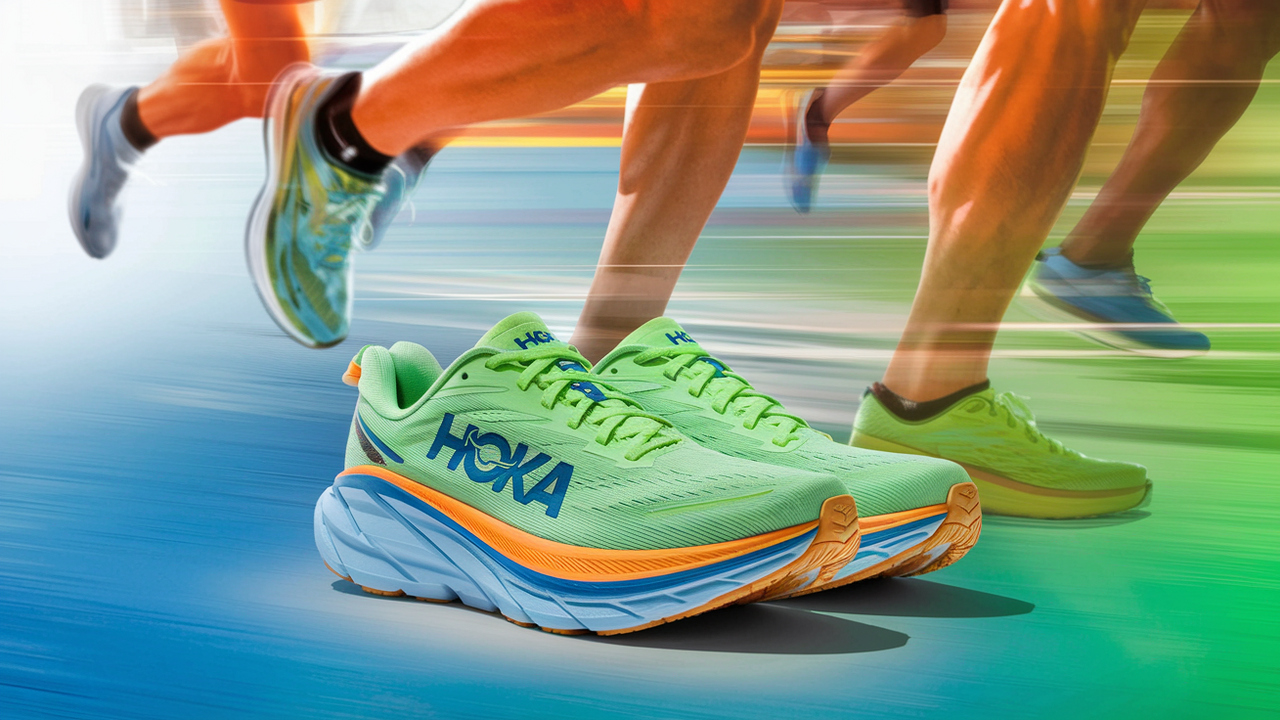Top Hoka Models for Marathon Training and Long Runs
When you’re logging hundreds of miles preparing for a marathon, not just any running shoe will cut it. You need something built for endurance, stability, and comfort, mile after mile. That’s why so many long-distance runners trust Hoka. Their signature cushioning and rocker design help reduce fatigue, improve stride efficiency, and protect your joints.
In this post, I’ll break down the top Hoka models for marathon training and long runs, based on durability, responsiveness, and comfort. Every pair listed is available on Amazon for easy ordering and fast delivery.

Table of Contents
1. HOKA Clifton 9 – Best Lightweight Trainer for High Mileage
The Clifton 9 is one of the most popular shoes for marathon training. It’s soft, responsive, and lightweight, making it a great daily trainer for both short and long-distance runs.
Why It’s a Top Pick:
- Balanced cushion-to-weight ratio
- Smooth transitions with Meta-Rocker sole
- Ideal for runners who want softness without bulk
2. HOKA Bondi 8 – Best for Recovery and Long Slow Runs
If you’re doing back-to-back long runs or need maximum recovery comfort, the Bondi 8 is perfect. It’s the most cushioned Hoka, great for runners who want to protect their joints during slower training days.
Best For:
- Easy runs and recovery days
- Heavier runners needing more impact absorption
- Runners prone to joint pain or plantar fasciitis
3. HOKA Mach 6 – Best for Tempo Runs and Speed Work
The Mach 6 is ideal for faster-paced training. It’s lighter and more responsive than the Bondi, but still gives you enough cushion to protect your legs during harder workouts.
Why It Works:
- Great energy return with PROFLY+ foam
- Lightweight design for interval and tempo sessions
- Perfect for race-paced training days
4. HOKA Rincon 3 – Best Budget-Friendly Marathon Shoe
Looking for a lightweight marathon shoe that won’t break the bank? The Rincon 3 gives you speed and cushion at an affordable price. It’s built for racing and high-mileage without sacrificing performance.
Top Features:
- One of the lightest Hokas (~7.7 oz)
- Smooth ride with early-stage rocker
- Great for tempo, long runs, and race day
5. HOKA Carbon X 3 – Best for Race Day and Long Progression Runs
If you’re in peak training or preparing for race day, the Carbon X 3 is built for performance. It features a carbon fiber plate for propulsion and a responsive yet stable feel.
Why Runners Love It:
- Built for marathon race day
- Propulsive carbon plate + foam combo
- Stable platform with long-distance comfort
What to Look for in a Marathon Training Shoe
When prepping for a marathon, your shoes need to hold up for hundreds of miles, handle various paces, and reduce injury risk. Here’s what matters:
- Cushioning: More mileage = more impact. Hoka’s plush midsoles help with that.
- Durability: Look for a shoe that can handle at least 400 miles.
- Weight: Go light for tempo days, moderate for long runs.
- Support: Some runners prefer neutral (Clifton, Rincon), others need stability (Arahi).
- Fit: Make sure the toe box has room, especially as your feet swell during long efforts.
Can You Use Hokas for Race Day?
Yes. Many marathoners wear Hoka Clifton, Rincon, Mach, or Carbon X models on race day. If you’re racing a marathon and want something light, propulsive, and supportive, go with the Carbon X 3 or Mach 6.
How Long Do Hoka Marathon Shoes Last?
Most Hokas last 400 to 500 miles, which covers a full marathon training cycle and more. I recommend tracking your mileage and rotating between two pairs to reduce wear and tear.
Final Thoughts
Marathon training is no joke. Your shoes need to work as hard as you do—and Hoka delivers. Whether you need max cushioning for recovery or lightweight responsiveness for race day, there’s a model here that’ll keep you going strong from mile 1 to 26.2.
Click here to browse all marathon-ready Hoka shoes on Amazon
Why Cushioning Matters in Marathon Training
When you’re consistently logging 30, 40, or even 70+ miles per week, your shoes need to absorb shock and protect your joints. That’s what makes Hoka so effective. Their maximalist cushioning takes pressure off your knees, ankles, and hips, helping you recover faster and stay injury-free.
How Hoka’s Meta-Rocker Helps You Go Farther
One of Hoka’s signature technologies is the Meta-Rocker sole, which gently propels you forward as you run. It’s a curved geometry built into the midsole that helps maintain your momentum and reduces the energy required with each stride—especially noticeable on long, steady runs.
Rotating Between Two Pairs of Hokas
If you’re serious about marathon training, I highly recommend rotating two pairs of Hokas. Use something like the Clifton 9 or Bondi 8 for slow/recovery days and the Mach 6 or Rincon 3 for speed sessions. This not only protects your legs but also extends the lifespan of both shoes.
The Bondi 8 for Heavier Runners or Injury Recovery
If you’re a heavier runner or coming back from injury, the Bondi 8 is the safest and most forgiving option. Its thick EVA midsole gives you a pillowy feel underfoot while still offering enough structure to prevent sloppy strides.
The Clifton 9 for Balanced Cushion and Everyday Use
Clifton 9 is one of the most popular Hokas because it walks the line between soft and responsive. It’s great for easy long runs, and because it’s so light and breathable, many runners use it as their everyday training shoe—on and off the pavement.
Mach 6: Secret Weapon for Race Pace Training
When you start running goal pace miles, you’ll want something that feels fast but not harsh. That’s where the Mach 6 shines. It’s responsive enough for tempo and progression runs but still offers Hoka’s signature soft landing. It helps you train fast without beating up your legs.
How the Carbon X 3 Fits Into Your Training Plan
The Carbon X 3 is perfect for the final stretch of training—especially long progression runs or half-marathon tune-ups. The carbon plate adds propulsion, helping you simulate race-day efforts while protecting your feet for the full 26.2 distance.
Why the Rincon 3 Is Perfect for New Marathoners
If you’re new to marathon training and looking for a lightweight, budget-friendly Hoka, the Rincon 3 is a no-brainer. It gives you race-day feel without the carbon plate price tag. Just don’t expect the cushion to last forever—it’s ideal for lighter runners or shorter cycles.
Don’t Overlook Width Options
One of the best things about Hoka? Many of their shoes come in wide sizes. If you’ve ever lost a toenail or had sore outer toes during training, give the wide version of Clifton or Bondi a shot. More room means less irritation as your feet swell during long efforts.
Traveling for a Marathon? Bring Hokas
If you’re flying to a race, trust me: wear your Hokas during travel. Not only do they help with post-flight swelling, but they’ll also save your legs while sightseeing the day before. I always pack a fresh pair of Bondis just for race weekend recovery.
Can Hokas Handle 20+ Mile Training Runs?
Yes—especially models like the Bondi, Carbon X, and Clifton. These are built to hold their structure and cushioning through long runs. Even after 18, 20, or 22 miles, they still feel solid underfoot. That’s a huge advantage over traditional race flats or minimal trainers.
When to Replace Your Marathon Hokas
If you’re training for a marathon, expect to replace your Hokas every 400 to 500 miles. Watch for signs of compression, lack of bounce, or uneven outsole wear. For race day, I always keep a fresh pair of my favorite model to avoid any breakdown surprises.


One thought on “Top Hoka Models for Marathon Training and Long Runs”